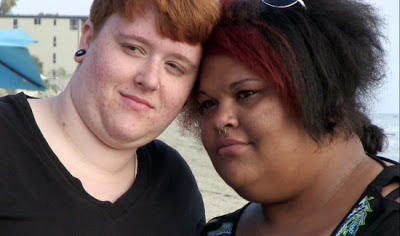My manager sent out an email to the whole department, congratulating me on my miniature promotion. There was a picture of me atop a brief bio that painted me as a very serious bookworm, and apparently it didn’t look like me at all, according to a coworker. “I didn’t choose the picture,” I told my coworker, a cute girl with long, curly hair. “He grabbed it off my LinkedIn page.”
“LinkedIn?” she asked. “What’s that?”
It was supposed to be a part-time job. I was fresh off of a
break-up with what I considered to be the epitome of soulless adulthood: a very
junior IT position within a very powerful government agency. So, maybe I
overcompensated for my occupational lack of whimsy when I copped this new gig:
part-time cashier at my favorite natural foods grocery store. But I was
starting a graduate program (more or less an act of panic) and getting SAT
tutoring and catering event gigs on the side (both of which paid more hourly than
my “real” government job, by the way). Three months, a full-time offer and one
promotion later, I found myself in the most curious position. What is the
appropriate balance between tending to the now and tending to the future? I
enjoy my job – but how much effort do I devote to something not contributory to
my eventual career? And who defines “eventual”—what timelines exist other than
socially generated ones? Am I rebelling, aiming too low, or just taking
advantage of the unmarked roadmap we affectionately refer to as “life”?
My gay childhood best friend is a raging and back-flipping alcoholic,
the type of friend you’ll love forever but sometimes need a yearlong break
from. Very recently, he was laid off from his “eh”-paying job, just months
after securing his own one-bedroom apartment that cost more than half of what
he earned monthly. He was forced to his limits, texting me for advice on
selling his Macbook Pro and even requesting via a Facebook status that 50
friends donate to him 20 dollars each. Just before eviction, his cell phone lit
up in glimmering gold with a job offer – one paying nearly double his previous
income. And not long after, he texted my roommate (and our mutual friend) to
ask, “Dana went from contract editor to working at a grocery store?” He told
her that I was needlessly being a renegade, and that “at this age, it’s crucial
to establish stability.” By the way, “this age,” for the both of us, is 24.
We’re old enough to admonish our peers for not yet achieving as much as we
have, but apparently too young to catch the irony in it all. The twenties are
not an excuse to do poorly. It just so happens that lots of twenty-somethings
do poorly, whether in terms of their careers, finances, or relationships. But
“poorly” is a matter of opinion, and age ain’t nothing but a number (thank you,
Aaliyah).
It is pointless to make comparisons. The only standards we
should be striving for are those set by ourselves. I recently came across an
essay I wrote for my introductory Philisophy class, which I took during my
freshman year of college. “Finding the cure for cancer or otherwise ‘saving
mankind’ is not the sole path to having meaning in one’s life, and is rarely
the case anyway,” I wrote. “Shucking oysters every day and playing the guitar
by fireside can have just the same, if not more meaning.” Apparently, I’ve been
the way I am at least since I was 19, and probably long before.
These types of short essays sometimes feel farcical, as if
it’s really possible to outline a huge, vague problem and a corresponding
brilliant realization in 600 words. I
don’t have a solution. Today, I sent off two very important applications. Later
this month, I’ll send off a third. If the responses I receive aren’t good, then
I’ll wait for the right opportunity to go for something else. And in the
meantime, I’ll be working 8 hours a day, 5 days a week at a very nice grocery
store in a very nice part of Maryland, enjoying myself and the good fortune of
being able to wear jeans to work.



